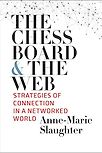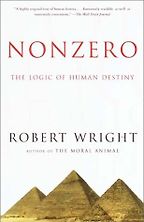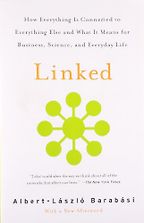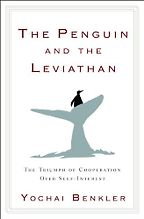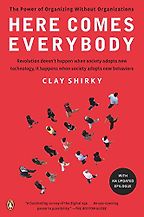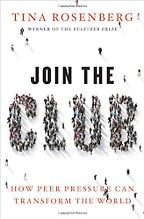You called the 20th century “a billiard-ball world” in an article for Foreign Affairs. What did you mean, and how do you expect the 21st century world to differ?
What I meant was that in the realm of international relations during the 20th century states mainly interacted like billiard balls – they were opaque and unitary. So it was France versus the United States versus the Soviet Union. The main object was to avoid overt conflict with one another.
In the 21st century states are still very important but they interact through their component parts – government agency to government agency, lawmaker to lawmaker, municipal government to municipal government. States can be taken apart and combined and recombined with lots of social actors like non-governmental organisations or corporations or foundations or universities. We’ve moved from a world where the international system has a limited number of players to a networks world in which there’s an infinite number of combinations.
In your writing and in the books you’ve selected, I detect an optimism about the upsides of globalisation and technology in the 21st century. But what about the downsides, like the proliferation of weapons technology and the spread of terrorism?
In the 1990s there was a whirl of optimism about globalisation. The first decade of the 21st century, starting with 9/11, was about the negative parts of globalisation – terrorist networks and more broadly global criminal networks involved in narco-trafficking, weapons trafficking and human trafficking. We even saw the return of piracy. We saw all the disadvantages of globalised criminal networks. And with the financial crisis of 2008, we saw the disadvantages of global interconnectedness, where banks collapsing in one country pull the entire system down. I think we’ve seen plenty of the negative side of globalisation. What I’m focusing on is how you can have positive networks as well as negative networks – I’ll be looking at the upsides of interdependence.
Your first choice is a big-picture book by Robert Wright that was widely read in Washington during the dawn of the 21st century. Please tell us about Nonzero: The Logic of Human Destiny.
Nonzero is a book that everybody should read. It is a big book – not a quick read. The Logic of Human Destiny – that’s a pretty big subject. What it essentially does is tell the story of steadily increasing complexity, of increasingly complex human interactions, from cave societies to current Shanghai. Wright sees human interactions as a Nonzero sum. While primitive systems might have run on dog-eat-dog or an-eye-for-an-eye zero-sum interactions, where I win means you lose, the story of human society is a story of people coming together and discovering it doesn’t have to be zero sum. Human interaction can be positive sum. We can cooperate in ways so that everybody wins. What Wright does is trace that logic through human history, and that logic is enormously important for understanding the complex systems we live in.
President Bill Clinton urged others to read Nonzero. Can we see the influence of Wright’s argument in how Hillary Clinton has guided the US State Department as Secretary of State, for instance in the focus on Internet freedom?
Absolutely. Secretary Clinton is way ahead of the curve. She has embraced government-to-society diplomacy and society-to-society diplomacy, which basically means connecting governments with people and connecting people with people. That is a far more complex challenge because there are billions of people.
When you start focusing on people rather than states you start focusing on all the complexities of their interactions, you think about how to build networks and you think about how to relate to different segments of society, like women and young people and entrepreneurs and scientists. It’s really a different vision of diplomacy.
What does this book tell us about the future of foreign policy?
Nonzero is essentially a foundational text for the other four books I cited and for thinking about foreign policy and more simply 21st century life. It doesn’t specifically address foreign policy but Nonzero conveys the idea that positive sum cooperation is indeed the direction of history.
The author of the next book you cited, Linked, is a physicist best known for his work in network science. Please introduce us to Albert-László Barabási, his book and network science.
Linked is about how to understand the world in terms of networks. To understand network science the first thing to do is to visualise the world the way you visualise the Internet or even the universe – hubs of infinitely intersecting networks. As the author says, everything can be reduced to links and nodes. This book is a very accessible introduction to the science of networks and to how to think about everything from anthills to traffic jams to complex conflict from the perspective of network science.
How can foreign policy makers harness network science?
It offers some of the tools for how to think about what you’d call in foreign policy “multi-stakeholder alliances”, which is a big clunky phrase for things like GAVI, the Global Alliance for Vaccines and Immunisation, or the International Campaign to Ban Landmines or countless other smaller public-private partnerships. These are all ways of assembling many different actors – governments, NGOs, corporations, foundations and universities – into large alliances, campaigns or networks to solve problems
According to David Brooks, “The US is well-positioned to be the centre of global networks and to nurture the right kinds of networks.” Is he right?
David Brooks, in that article, quotes an article I wrote in 2009, which said that the world is a set of intersecting networks, power comes from being as close to the centre of those networks as you can and the United States is the most connected nation on earth by virtue of our people, our geography and our technology. The United States should be thinking about how to maintain the central position we have and how to strengthen the networks we’re part of.
The Penguin and the Leviathan by Harvard Law School Professor Yochai Benkler is your next selection. Please tell us about the book, beginning with its puzzling title.
The leviathan, everybody should know, is the whale and the name of Hobbes’s famous story of why you need a state, which many will remember from political theory 101. It essentially says, without a state the human condition is a war of all against all and so you need a leviathan, a huge powerful central body to enforce order and prevent people from killing each other. The penguin is the emblem of Linux, the open software system that has no central rules. It has no intellectual property protection and no traditional corporate structure – it’s open and it’s free.
In this book Yochai Benkler tells us how human beings can cooperate. He looks at research in many different disciplines – neuroscience, biology, sociology and computer science – to show how we can encourage self-organised cooperative behaviour.
So Benkler argues that we organised the state around unflattering assumptions about human nature. Is he right? You worked in the first two years of the Obama administration. Was foreign policy built on a Hobbesian view of human nature? And if so, how did you attempt to change that as the State Department’s director of policy planning?
The first thing to say is you need both the leviathan and the penguin. Nobody who’s been in foreign policy or, frankly, in human society should ever think we don’t need the state. No, I don’t believe in Rousseau’s happy harmony of human beings. There are plenty of bad people out there – you do need a state empowered to use force and apprehend those who are not willing to play by the rules. In the international system you’ve got North Korea; you’ve got Iran pursuing a nuclear programme that could be very dangerous, and until recently you had Burma. Then there are states that are not necessarily as outside the system as those three, but even with trading partners and allies, like China and Russia, you still sometimes need to think of relations with those countries in terms of force, power, pressure and very strict rules of the game. So the first thing to say is the leviathan is still very much with us and our foreign policy assumes that there is a need for coercion.
“The leviathan is still very much with us and our foreign policy assumes that there is a need for coercion.”
But the state as leviathan is premised on a view of only part of human nature – there’s a whole other part. We are social animals and we are happier when we are collaborating with others and connected to others. That part of human nature can be encouraged and harnessed to bring about positive change. I would give the examples of the social political movements across the Middle East where you see young people coming together pretty spontaneously, saying: We want a different way to live, we want our rights, we want democracy, we are going to work together for change. That is cooperative behaviour. That example does not mean that they won’t need a state and a leviathan once they succeed. I offer it to show the other side of human nature which foreign policy can foster and support.
That provides the perfect transition to your next suggestion. Here Comes Everybody: the Power of Organizing without Organizations by new media guru Clay Shirky is your penultimate pick. What is it about and why did you select it?
This is another must-read. It’s a really great book for anyone who wants to understand the social media revolution. Benkler talks about the cooperative system. Shirky talks about self-organisation, about how the digital revolution and the social media revolution completely changed the economics of organisation. It used to be much harder for people to organise. There was a lot of cost to it. But with social media you can organise a group of your friends instantly. So all sorts of phenomena that once would have been too costly to create suddenly emerged. It’s suddenly simple for human beings to come together simply because they share a common passion – it might be a political ideology, it might be the love of surfing.
Social media creates all sorts of new possibilities for economic and social entrepreneurship, for community activity and for pursuing very specific passions. Think about Meet-Up, for instance. You want people to organise around anything from skateboarding to political activism? It’s very easy to do.
How will crowd sourcing and other online collaborations affect 21st century foreign affairs? And if people can do things together what will become of the traditional organising structures for foreign policy formulation?
This is cutting-edge foreign policy. There are opportunities to create templates of things that can self-replicate. I’m going to give you a very concrete example. Alcoholics Anonymous is a model for how you get a number of people together and get them to support each other in breaking their addiction to alcohol. Once you create that template, any group can create its own. You get Narcotics Anonymous and Overeaters Anonymous. It’s like Meet-Up, you create a template for how to call a meeting and then any group can call that meeting. Or something as simple as the TEDx talks – you create a template for how you’re going to hold a TEDx conference and suddenly thousands of groups want to do it.
So imagine if we could do that around things like getting clean water for your village or improving security in your neighbourhood or getting immunisations for the children in your area. If we could figure out how to create the conditions under which people will self-organise around such positive activity we will open up all sorts of possibilities for engaging with societies as a whole. That is not something we have done systematically in foreign policy before. I think it’s a frontier.
Which takes us to Joining the Club, your final selection. In it, the American journalist Tina Rosenberg argues that peer pressure, which traditionally carries negative connotations, can transform the world for the better. Please tell us about her book.
These books are all linked, no pun intended. Tina Rosenberg had a column for The New York Times called “The Fix”, where she looked at how you fix social problems. One of her answers is that you basically harness peer pressure for good. She would use the example of Alcoholics Anonymous, too. If you want to break your addiction you surround yourself with other people who want to do the same and they will support you. Weight Watchers is another good example.
What Rosenberg does in this book is to show that this model can work for everything, from helping kids learn calculus to overthrowing a dictator. She’s gone around the world and examined how the “social cure”, by which she means effectively creating positive peer pressure through small groups, has actually been used to address all these problems. The political example she gives is the group that helped mobilise Serbian society to get rid of Slobodan Milosevic. That group has since held seminars for groups in many, many different countries. This is self-organisation of a particular kind, connecting peers who can support others in very positive behaviours.
Can you give us a little more understanding of the mechanics? How can peer pressure be applied in foreign policy?
You’ve got to read the book. In some ways it’s intuitive. Just think about negative peer pressure. When kids get involved in drugs, what’s the explanation we give? We say they’re more responsive to what their peers think than what their parents say. That’s generally true for people across any number of activities. We are social animals; we are highly susceptible to what the people we are closest to think and also what they do.
There are all sorts of social cures. If your friends smoke or if your friends’ friends smoke you’re more likely to smoke and the same thing is true of healthy behaviours. What the social cure does is get peers together who support, say, learning calculus in an atmosphere where it’s fine to ask a question, so instead of peer pressure making you feel stupid because you asked a question it makes you feel like you should be asking questions. You’re learning behaviour through different social clues.
Can you point to a way in which policymakers are currently harnessing peer pressure for geopolitical good? Is there such a programme that you put into play at the State Department?
Not specifically, but yes in a sense. Think about microfinance and how that works. Circles of women support each other in repaying the loans. Or think about one of the things the State Department has done a lot: Fostering entrepreneurship by connecting young entrepreneurs to each other and then to a larger entrepreneurial ecosystem, including investors and mentors.
What we’re trying to do is create groups of people who will be very supportive of a young person who has an economic idea and wants to turn it into a business. The State Department is creating youth councils at different embassies, partially to suggest to the ambassador good things for the US embassy to do, but these youth councils are also creating a positive environment in which it’s acceptable for young people in anti-American societies to engage with the United States. It’s more likely that people will do that in a group of their peers than on their own.
Where do you see the shift to 21st century State Department policy?
Let’s look at a situation in which we negotiate with other governments. Secretary Clinton goes to China for an economic dialogue. That’s just what we’ve always done, state-to-state interaction. But she took with her health officials, education officials, environmental officials and border security officials. The issues these officials handle were once purely domestic affairs, but now we are connected to the Chinese and many other nations in how we fight disease, protect the environment, guard against terrorism and promote energy conservation. That’s one part.
The second part is look at what happens when she goes. A Chinese dissident who is connected to other human rights dissidents around the world suddenly creates a major crisis in China. The way we address H1N1 and avian flu, problems that are created as a function of our interconnectedness, is not by negotiating treaties with governments. We address problems without borders by actively engaging with both governments and their societies. Look at our outreach to women during the Arab Spring, our efforts to build finance in the Middle East, look at the countless public-private partnerships we are fostering to address health problems and resource scarcity. All of that is foreign policy in a network world. I would say it’s half of what the State Department does and growing.
“Interdependence theory has a reputation on the right for being a namby-pamby doctrine for naive lefties,” Robert Wright wrote in a 2001 essay. What is the best evidence that the right is wrong about interdependence theory?
The best evidence is that this is the world in which everybody under 35 lives. The 21st century world is completely interconnected. The cutting-edge businesses in the global economy – Google, Amazon, Facebook, Apple and countless others – are all embodiments of deep network interdependence. Since Robert Wright wrote that a global economic crisis rocked the world, but we know if we try to cut ourselves off from the rest of the globe we will miss all the dynamism and the power of being able to connect with others. So there is no question that interdependence is real. The real question is how to get less of the bad interdependence and more of the good interdependence. The world is moving toward greater interdependence. You can call it soft and ignore it but then you’re going to be left behind.
May 31, 2018. Updated: May 25, 2022
Five Books aims to keep its book recommendations and interviews up to date. If you are the interviewee and would like to update your choice of books (or even just what you say about them) please email us at [email protected]
Five Books interviews are expensive to produce. If you've enjoyed this interview, please support us by donating a small amount.

